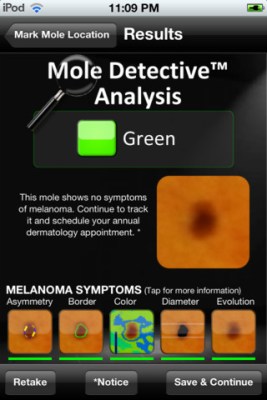Dermatologists can rest assured that they will not be replaced by computers anytime soon. A new study finds that smartphone applications designed to automatically detect cancer lesions misdiagnose more than half of all malignant growths. “There’s no substitute, at this point, for a complete skin exam performed by an expert dermatologist for picking up melanoma as well as other skin cancers,” said University of Missouri dermatologist, Dr. Karen Edison (who was not involved in the study).
Since cancer-detecting apps aren’t approved by the Food and Drug Administration, most apps, such as Mole Detective, have butt-covering legal language like, “Always defer to a medical professional if you feel that a mole looks suspicious. Mole Detective’s intent is not to diagnose but to help you better track the symptoms of melanoma at home.”
Making cancer detection habitual could be a good thing, but it also might lull users into falsely believing that an actual tumor is benign.
This isn’t to say that all of the apps were failures. One of the unnamed apps in the study sends a picture of the user’s skin to a certified dermatologist (for $5 an evaluation). The consultation app misdiagnosed just 1 of 53 cancerous lesions.
This is good news for telemedicine startups, such as hospital-in-a-box, HealthSpot, that aim to bring low-cost health care to under resourced or overcrowded areas of the world.
The study (for now) is free to read on the Journal of The American Medical Association website here.
[Image Credit: iTunes]
